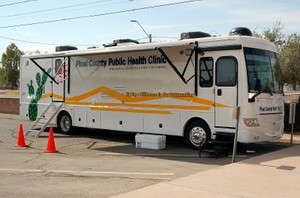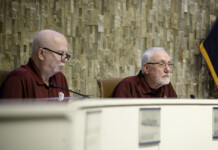
Thanks to a $298,000 grant from the Gila River Indian Community, the Division of Public Health now has a mobile health clinic to serve the northwestern part of Pinal County. The final cost of the large recreational vehicle turned health clinic: $315,000.
Assistant County Manager for Health and Human Services Lisa Garcia was all smiles when she talked of the mobile health clinic and the possibilities it provides. “It launches us into a brand new realm when it comes to health care,” Garcia said. “We now have the resources to make a difference.”
Once the vehicle is given a health clinic certification from the Arizona Department of Health Services, a crew of three (operator, nutritionist and nurse) will hit the road, working to improve the health in areas that are underserved. It is hoped to have the mobile clinic fully operational by the end of August.
“The primary use will be for the Women’s, Infants and Children’s (WIC) program,” said Public Health Director Tom Schryer. “We’ll be able to provide such services as education, car seats, enrollment into kids care and much more. It will be a real asset to the community.” The WIC program in Maricopa presently uses justice court facilities.
Schryer added that he is certain the need for the mobile clinic will grow as partnerships are formed with various entities in the county. He said that an outreach program to schools, health service providers and health fairs will take place to let people know about the vehicle and its capabilities.
With the growth of the county and the increasing need for services in areas that do not have a health clinic, Schryer surmised that the need to have additional mobile clinics probably will present itself.
“Our plan is to have three in the next two years,’ the Public Health Director said. “The idea being that each mobile clinic would have a standard route to follow.”
The priority, Schryer said, is to place the vehicles in area where there are little or no services. The mobile clinic will give them the flexibility to target areas where the need is greatest rather than spending the money to build and open a new clinic.
The credit for the mobile clinics, Garcia said, goes to the Supervisors and the Gila River Indian Community.
“The Supervisors have shown leadership in the health care community,” Garcia said. “Combine that with the partnership of the Gila River Indian Community, and the result is going to be traveling throughout our communities to improve the quality of life in Pinal County. This is a huge milestone for everyone.”









![State: Pinal County fire activity concerning Tucson's Northwest Fire District crew members assist in firefighting efforts on the "Flying Bucket Fire" approximately 15 miles southwest of Maricopa on May 8, 2024. [Northwest Fire District]](https://www.inmaricopa.com/wp-content/uploads/2024/05/GNEq06pbwAA6JlT-218x150.jpg)

![Carl’s Jr plans to “open soon” An exterior view of the new Carl's Jr. restaurant along John Wayne Parkway on May 7, 2024. [Elias Weiss]](https://www.inmaricopa.com/wp-content/uploads/2024/05/E1C66482-CB4C-4FD0-BA30-35CECE93F4BE-218x150.jpeg)
![Traffic change to reduce backup at Villages intersection The intersection at Butterfield Parkway and West Edison Road on May 10, 2024. [Brian Petersheim Jr.]](https://www.inmaricopa.com/wp-content/uploads/2024/05/PJ_5644-218x150.jpg)




